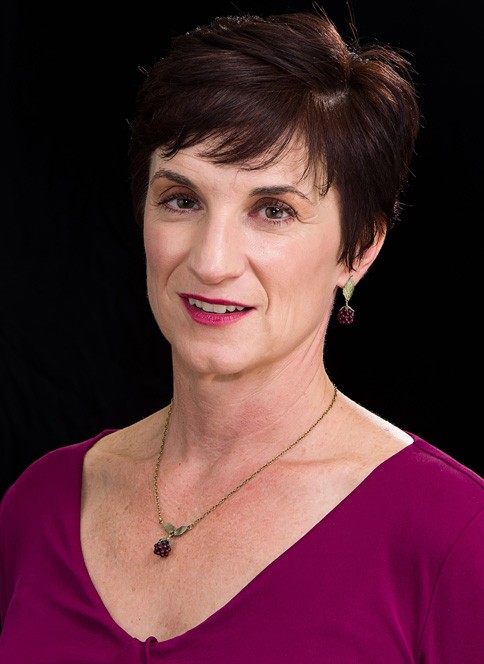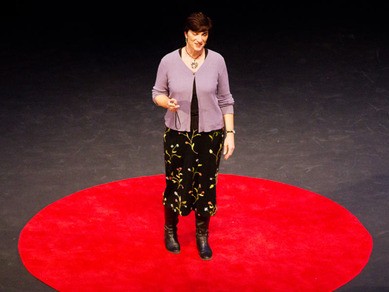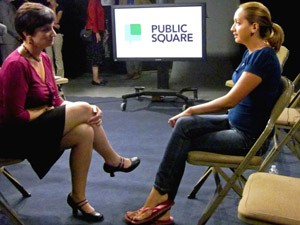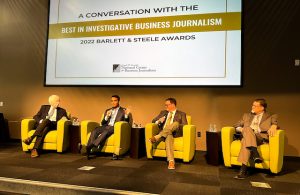
From real estate and economic development to tourism and the creative economy, Megan Kamerick has dabbled in almost every business beat. In her 20-year career, she has been a business reporter and editor at the San Antonio Business Journal, the New Orleans CityBusiness and, most recently, the New Mexico Business Weekly. She has won multiple SPJ awards and was named outstanding small business journalist in New Mexico by the U.S. Small Business Administration’s New Mexico office.
Kamerick is currently the host and producer of “Public Square” for New Mexico PBS, a show that provides open dialogue between citizens and state and local leaders. She is also an independent producer at KUNM radio and produces newscasts and interviews for the show “Women’s Focus.”
As a freelance journalist, Kamerick has the unique ability to work across all of the journalism mediums- print, radio and television- and knows what skills are necessary for each. She may not be doing business journalism at the moment, but said she is “deeply grounded in it.” Below she shares her thoughts on why a financial foundation and a business journalism background is vital for any beat.
1. You said you are deeply grounded in business journalism. How do your business reporting skills affect your daily life?
I never thought I’d be a business journalist. I was going to be a features reporter in the arts. But it has taught me so much. For one thing, it showed me I can do these stories. Anyone can learn to do them. Don’t be afraid. If I can drop into South Texas and start covering commercial real estate (talk about a male-dominated world!) straight out of grad school, anything’s possible. And it showed me how important money is to everything. That doesn’t mean you need to love all the permutations of capitalism. But it has given me a deeper appreciation for the role money plays in everything. It’s much more powerful than politics, for good or for ill. And it has given me a deeper understanding of the communities where I have lived. Maybe it’s because I covered small business and entrepreneurs for many years, but I now understand how important they are to a community’s existence and to the character of a place.
Also, through covering real estate, and all the related policies about land use and urban design, I realized how fascinating it is to study the impact of these things on cities. I haven’t covered real estate for years, but I still look at these things when I travel and ponder why some cities are thriving and others are dying.
2. One of your beats was “the creative economy,” what stories do business journalists need to pay more attention to in this area? What was it like covering that beat?
I loved covering that beat and again, I never saw anyone else looking at arts and culture that way in my market because these worlds are often silo-ed. I was always at smaller business weeklies. So if I wanted to write about that, I didn’t need to get clearance from the arts desk. I just did it. It crossed into tourism, too, because there is whole rising trend around creative tourism – people who travel to learn how to do things, like cooking classes, photography workshops, flamenco classes (Albuquerque is a major center of flamenco). So how can communities leverage that? What can they offer along those lines to lure tourist dollars?
Also, artists are just as much entrepreneurs as the guy making the widget in his garage he hopes to patent. Not all of them are business savvy, but they have to be if they are making a living as a full-time artist or performer. How are they doing that? What business strategies are they using? And how do arts and culture factor into economic development? Which cities are tapping into this? A museum mounting a major show on Degas, for example, is also networking with all kinds of partners in tourism and restaurants and other sectors to lure as much outside money as possible. That is certainly a business story.
In New Mexico, we have thousands of artisans in isolated rural areas who feed their whole families based on their craft or artwork. They are entrepreneurs. They are similar to the artists from around the world who come to the Santa Fe International Folk Art Market each year. This model has made all kinds of impacts around the world in developing countries by helping artisans get better at what they do. The market trains them in pricing their goods, accessing international buyers and tapping into the wholesale market. That has brought enormous change to impoverished villages, especially when women can bring in more income to support their families. That’s economic development.
3. While Public Square is not directly business-related, there have been some stories that have business angles. What advice do you have for business reporters in finding the business angle in stories that may not seem to have one at first glance?
It’s clichéd, but follow the money. It’s there in every story. People are hungry for economic news as long as it’s presented in interesting, compelling ways. My biggest beef with a lot of media I see is that things get very silo-ed (I’m not sure this is a legit word but it’s becoming part of business lexicon.) Part of this is the beat structure. I live in a state that was just ranked dead last in things like child well-being and education. This has enormous implications for economic development. How can you draw those connecting lines? I wish I saw more news that did that. But those worlds are often silo-ed, too.
I was disappointed that when I went to the conference announcing these findings there were a lot of tables sponsored by corporations and banks, but not many of the people from those institutions were there. They needed to be in that room thinking of solutions with the people in the social services sector. That’s why I started covering early childhood development issues as a business reporter. It was the one area where these worlds were starting to come together. I found that in microfinance as well. And I think they can inform each other.
4. Many business reporters have interests beyond just business, what advice do you have for them in pursuing those other interests?
By all means pursue them! For one thing, you will get better stories. And if it makes you happier and helps curtail burnout, all the better. I don’t believe in working yourself into an early grave, but all good reporters should have their antennae up all the time. You might just hear a great tip or lead at that play rehearsal, at a gallery opening where a business leader is relaxing with a glass of wine and more inclined to drop a juicy lead into conversation. I remember getting a huge lead about a big corporate player moving hundreds of jobs to San Antonio at a post-theater soiree at some architect’s house. We beat everyone on that story.
5. What sparked your TED talk on women and the media?

I have been a member of the Journalism & Women Symposium for many years and served as president. I knew the abysmal numbers in terms of women in newsrooms. The leadership pipeline is very leaky. The op-ed pages and talking head shows are still heavily dominated by white men. Naturally, I want to see these things change for myself and for all women in my profession. When I pitched the TED talk, I realized I needed to go a step further and explain why the world at large should care. It’s the same reason the world should care that newsrooms are shedding jobs and curtailing delivery and focusing on entertainment news to get easy hits online or snag viewers. We all need good, accurate news if we are going to have a stable democracy. And that means having people in news organizations making decisions on coverage who look like the world we are covering. Otherwise we undermine our own credibility and our ability to deliver accurate news. It’s common sense. We all have blind spots. One way to overcome those is to have people at the table who have experiences that are different than your own.










